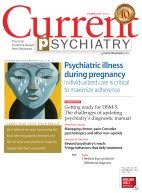Nabil Kotbi, MD, Assistant professor of psychiatry, Weill Medical College of Cornell University, New York-Presbyterian Hospital, White Plains, NY
Nahla Mahgoub, MD, Instructor in psychiatry, Weill Medical College of Cornell University, New York-Presbyterian Hospital, White Plains, NY
Anna Odom, PhD, Instructor of psychology in psychiatry, Weill Medical College of Cornell University, New York-Presbyterian Hospital, White Plains, NY
Depression in older adults (age ≥65) can devastate their quality of life and increase the likelihood of institutionalization because of behavioral problems. Depression is a primary risk factor for suicide, and suicide rates are highest among those age ≥65, especially among white males. The burden of geriatric depression can extend to caregivers. Prompt recognition and treatment of depression could help minimize morbidity and reduce suffering in older adults and their caregivers.
Although geriatric depression varies in severity and presentation, common categories include:
- major depressive disorder (MDD)
- vascular depression
- dysthymia
- depression in the context of dementias, psychosis, bipolar disorder, and executive dysfunction.
Read full text (free access)
Comment on this article
Email the editor


No comments:
Post a Comment